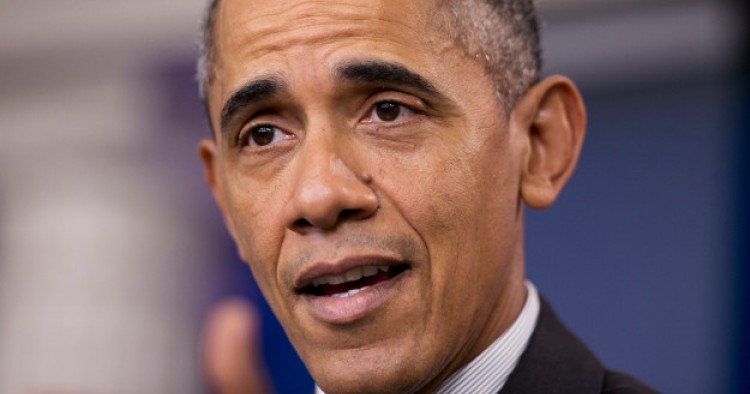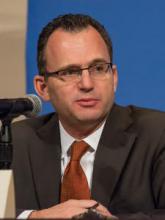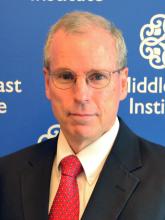In this week's Monday Briefing, MEI experts Paul Salem, Jean-François Seznec, and Robert Ford provide analysis on recent events including President Obama's final GCC summit, the Doha oil summit, and protests over Iraq's cabinet turmoil.
Obama’s Thursday G.C.C. Summit
Paul Salem, Vice President for Policy and Research
Although the relationship between the Obama administration and the G.C.C. has frayed over the Iran nuclear deal, the handling of the Syria crisis, and other issues, the two sides still share deep common interests in Gulf security, the free flow of energy, curbing Iranian regional intervention, and defeating ISIS.
The United States and the G.C.C. are not allies in the technical military sense, but there are attempts from both sides to try and stabilize the relationship. Coming after the U.S.-G.C.C. summit in Camp David last May, this meeting is intended to cement a tradition of annual U.S.-G.C.C. summits that is hoped to continue with the next administration.
The agenda of the talks will include the following:
- Strengthening G.C.C. security through military and security relations with the United States and NATO.
- Pushing back against Iran’s continued regional aggressiveness after the nuclear deal.
- Coordinating and advancing the war against ISIS.
- Encouraging progress on peace talks in Syria, Yemen, and Libya.
The meeting will be clouded by fallout from President Barack Obama’s “free riders” remark in The Atlantic and a current controversy over a congressional bill that would allow the Saudi government to be held responsible in American courts for any role in the 9/11 attacks.
This will be Obama’s last G.C.C. summit. The two sides will be looking to coordinate in the months remaining until January 2017. But G.C.C. leaders are following the bewildering presidential primaries closely to figure out if their relations with the United States will strengthen post-Obama, or head toward a deeper rupture.
No Deal in Doha
Jean-François Seznec, MEI Scholar
The Doha meeting resembled more a schoolyard squabble rather than a diplomatic forum, and it centered on the two usual suspects: Saudi Arabia and Iran. Saudi Arabia demanded Iran accept a production freeze, while the Iranians refused, as they have already lost half of their market share to the Saudis. The Russians backed the Iranians, and the end result was a deadlock: no deal and everyone loses!
Saudi Arabia benefited immensely from the sanctions on Iran and was able to gain market share in the Far East when Iran could not export easily. Predictably, Saudi Arabia wants to maintain its dominance of the market and force Iran, as well as Russia, to accept the status quo of Saudi production at 10.3 million b/d. The Saudis currently have the largest cash reserves of any oil producer and can sustain low prices longer than anyone.
Even though it could be more profitable for Saudi Arabia to return some of Iran’s market share, the kingdom wants to force two very powerful and proud countries to abide by its terms. However, both Iran and Russia have the ability to sustain great hardship, as they have done for decades. The Saudis may soon realize that a more diplomatic and imaginative approach to both the oil markets and to Middle East strategy may achieve more results. Until then, the price could go back down to $30/b or less.
Tough Week Ahead for Iraq’s PM
Robert Ford, Senior Fellow
The Iraqi parliament is scheduled to meet again on Tuesday to vote on Prime Minister Haider al-Abadi’s new cabinet list. Baghdad and some cities in southern Iraq will see growing protests over the next few days to demand an end to corruption and a new government. Abadi, whose handling of the cabinet change and reform program has not been adroit, continues to enjoy firm support from the United States.
The constant pressure from the Islamic State on the Iraqi state gives the Americans some leverage with other Iraqi leaders on behalf of Abadi. The prime minister also enjoys, at least for now, support from Shiite cleric Moqtada Sadr, who is demanding approval of a new cabinet list by Tuesday. Many members of his political bloc are deeply involved in intense negotiations behind the scenes, and he will likely sustain pressure rather than try to blow up the long, slow process.
The parliamentarians who revolted last week and tossed parliament speaker Salim al-Jabouri aside, including many Sadrists, are divided amongst themselves. In the absence of new blocs and leaders emerging in the crisis, old leaders can slowly restore their authority and order over the restive parliamentarians. Notably, some of the parliamentarians who revolted against bloc leaders last week are now pledging respect for the institution of parliament and the constitution. There are multiple lines of urgent negotiation about the new cabinet and the blocs underway. Iraqi politicians are masters of this kind of late-night tea and talk, and the Tuesday meeting could well be postponed or prove inconclusive, while talks behind closed doors drag on through the week.
The Middle East Institute (MEI) is an independent, non-partisan, non-for-profit, educational organization. It does not engage in advocacy and its scholars’ opinions are their own. MEI welcomes financial donations, but retains sole editorial control over its work and its publications reflect only the authors’ views. For a listing of MEI donors, please click here.















